|
77 Biggin Street
  
72 Biggin Street
  
Dover
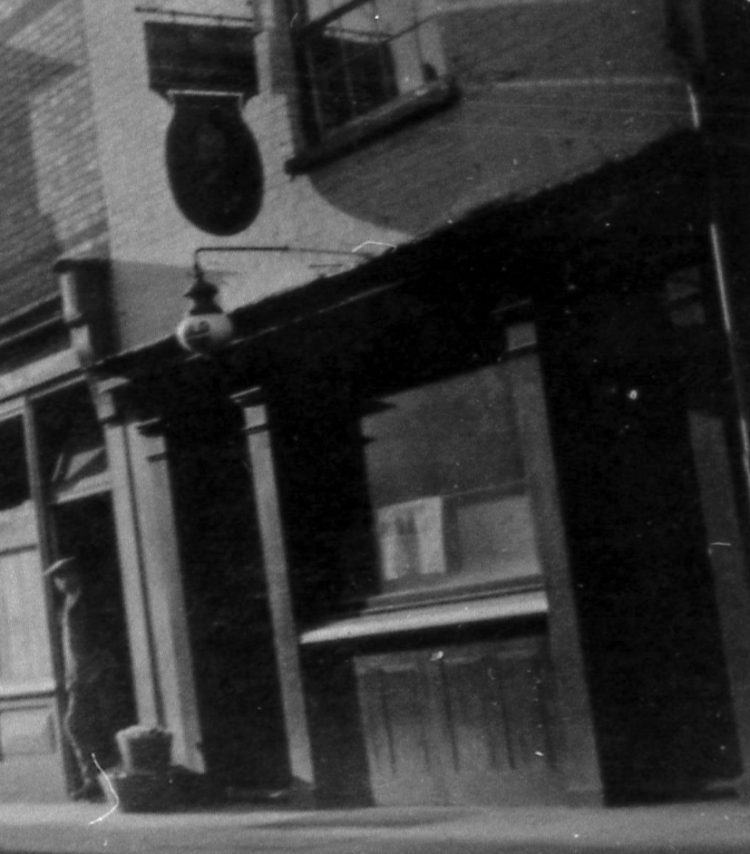
Above photo, circa 1910, kindly sent by Paul Wells. |
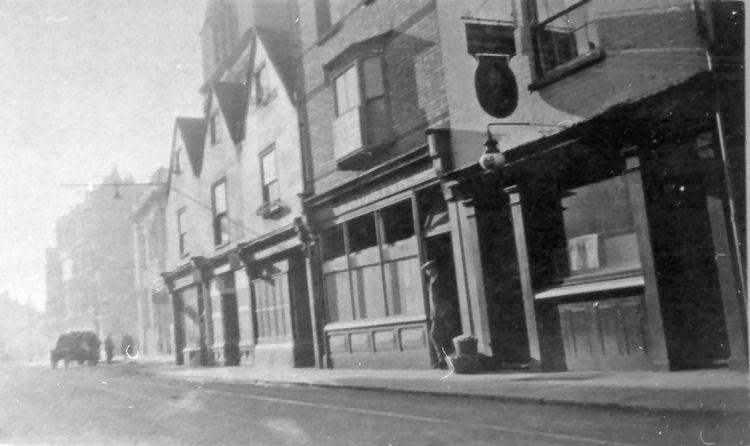
Above photo showing the rest of the road. |
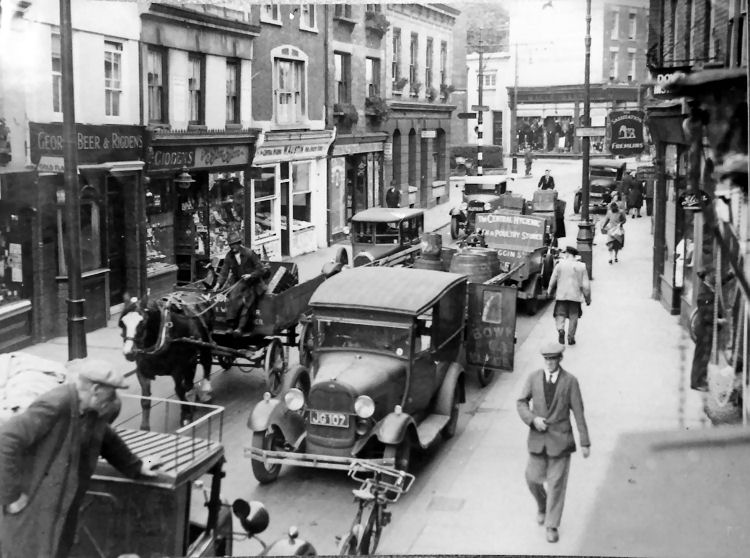
Above photo, circa 1930, kindly sent by Paul Wells. |
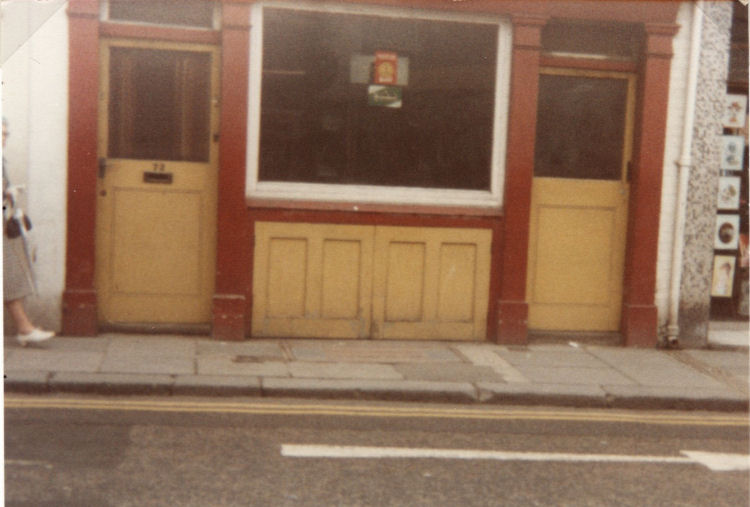
Photograph below by Barry Smith, circa
1980. |
Some rebuilding took place in the street at the end of the
last century. I found no evidence of that here, apart from the numbering
altering as others were rebuilt no doubt on a grander scale. It was always
77 up to 1895.
|
Kentish Gazette, 5 April 1853.
Alfrey Kingsford v. George H. Hudson.
A claim for £1 11s. 6d., for a barrel of beer alleged to have been
supplied to defendant. From the statement made, it appeared that
defendant was formerly landlord of the "King William," Charlton. On
that occasion of his giving up the tenancy of the house, he ordered
a barrel of beer on account of the new tenants, but failed fully to
apprise the brewer of the charge in the tenancy.
Order to pay the present claim, and recover the amount from the
tenant succeeding defendant.
|
|
From the Dover Express and East Kent Intelligencer,
8 November, 1867.
INFRINGEMENT OF LICENSE
Edwin Groombridge, the proprietor of "William IV" public-house, was
summoned for having his house open during prohibited hours on Sunday
last.
Police-sergeant Stevens proved the offence.
Defendant was clearly ordered to pay the costs, 8s., it being his
first offence.
|
This beerhouse of Flint passed eventually to Whitbread. A
planning application was presented in March 1977 which asked for the
demolition of numbers 72 to 77 Biggin Street and their replacement with
shops and offices. In furtherance to that, the new year of 1979 saw the
closure of the pub and the building itself disappeared in November that
year.
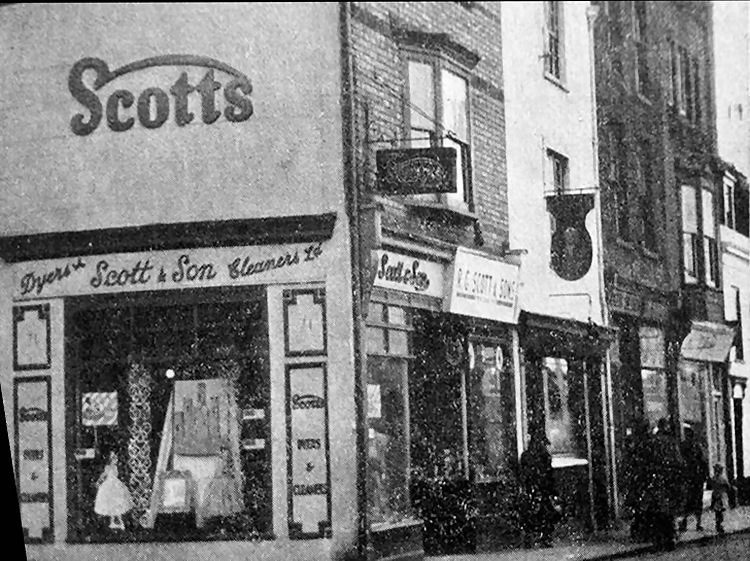
Above photo, date unknown. |
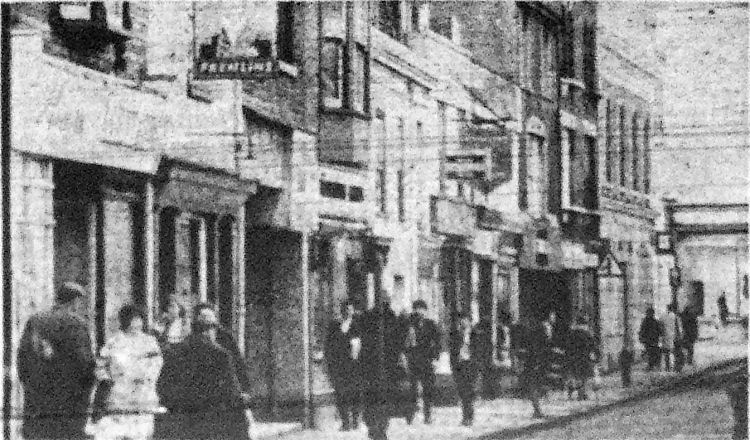
Above photo, "King William" 1970. |
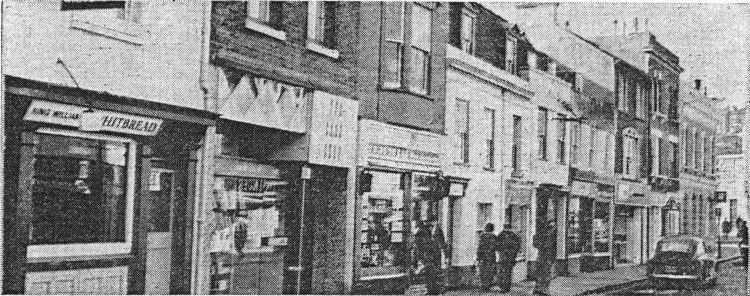 |
|
10 February 1978, Dover Express.
No objections to brewers' plan, which means
demolition of another piece of old Dover:
HOPES of finding a new rich area of archaeological interest - only
yards from Dover's ancient town hall came this week with a request for
time to dig in Biggin Street where shops are to be demolished for
redevelopment.
The planning committee on Friday granted permission to Whitbread Fremlin
Ltd., to demolish 72-77 Biggin Street and to replace
them with shops, offices and ancillary storage premises.
This was after fears had been expressed by some Dover district
councillors that the firm could demolish the properties and then fail to build on the site - thus leaving an
ugly gap.
Warning of the potential risk of an ugly gap came from Councillor Harold Dennard (Dover). But Miss Kathleen Goodfellow
replied that the firm was hardly a fly-by-night organisation.
A clause in the planning agreement ties the applicant down to rebuilding
in a set time.
The Archaeological Rescue Unit has asked permission to investigate
the area, after demolition, to find further traces of hidden features of
ancient Dover. Councillors hope this will be acceptable by Whitbreads.
The seven properties to come down include the King WiIliam IV public
house, a wine merchants, Eddie Crush's old shop now used for the
sale of novelties, the old British Queen public house and Giddens the
jewellers.
In their place it - is proposed to erect five shops and a kiosk, with
about 4,000 square feet of offices above.
Pedestrian access is also proposed to the ancient St. Edmund's ChapeI, which fronts Priory Road. It is planned to make the chapel the
central feature of a garden area. But who will pay for the maintenance
of this amenity area has yet to be decided.
Demolition of the shops will reveal a hitherto hidden wall of the
little wayside chapel and it is also intended to renovate this.
|
|
From the Dover Express and East Kent News, Friday,
28 February, 1868.
CAUTION TO DRIVERS.
Thomas Bond, a carter, was charged with having a horse and cart under
his care and being at such a distance from the cart as not to have due
control over the horse - briefly, with leaving his horse and cart
unattended.
The defendant did not deny the charge, but pleaded in extenuation
that he was not away from his horse and cart "more than ten minutes or a
quarter of an hour."
The presiding Magistrate (Mr. Mowll) said that a hundred accidents
might have happened in that time, and defendant must be aware that he
ought not to leave his horse and cart at all.
The defendant said he did not leave the horse and cart at a place
where it would start. Besides, it was a very quiet animal and would not
move unless made. (A laugh.)
The Bench said these excuses did not avail, and ordered the evidence
to be taken.
Police-constable Baker then said that he was in Biggin Street on
Thursday evening about ten minutes past 7, when he saw the defendant's
horse and cart straying up the street. The cart was loaded with dung,
and there was no one in charge of the horse, so he pulled it up, and
drew the horse and cart by the side of the road near the "Prince
Albert," where he waited with it five-and-thirty minutes. A friend
of the defendant's then came along and tried to take the horse and cart
away, but witness refused to give it up to anyone but the driver; and
the defendant shortly afterwards made his appearance from the "King
William the Fourth," a public-house in the same street. When the
defendant came up he was rather the worse for drink, but as his friend
was with him he allowed him to take the horse and cart away. He asked
him, however, if he was aware how long the horse and cart had been
there, and the defendant remarked that he had been away only to get
something to eat and drink. Witness, however, recognised the defendant
as a Dover man, and knew that he lived in Victoria Row, and he then
implored him to say nothing of the matter, but witness told him that it
was a case he could not overlook.
In answer to the evidence of the policeman, the defendant repeated
that he was away from his horse and cart only a quarter of an hour, and
he thought he was by law entitled to be away twenty minutes.
The Magistrates said the case was clearly proved against him. As an
old driver he must have been aware that he was breaking the law. The
Bench understood he was a married man with a large family, and they
regretted, therefore, that in punishing him they were punishing
indirectly his wife and little ones; but such a case as this could not
be passed over with due regard to the safety of the public. He would be
fined 2s. 6d. and the costs; in default, seven days' imprisonment.
The defendant said he had no money, and must go to prison. He was
removed in custody.
|
|
From the Dover Express and East Kent News, Friday, 28 January, 1876. Price 1d.
WORKMEN'S DINNER
On Wednesday evening, Richard Dickeson, Esq, gave a dinner to the
workmen of Mr. Parks, builder, who were employed at his house, No. 1,
Esplanade. The repast was got up in excellent style by Mr. Edwin
Groombridge, of the “King William IV Inn,” Biggin Street, and about
fifty sat down to a substantial spread. After the usual loyal toast had
been given and suitably responded to, the healths of Mr. and Miss
Dickeson were drunk with great enthusiasm, the toast being acknowledged
by Mr. E. Brewer. The health of their employer, Mr. G. T. Parks, was
afterwards given and suitable responded to. The room was very neatly
decorated, the principal motto, in needlework, being, “Long life and
happiness to Mr. and Miss. Dickeson.” The party broke up at eleven,
being well satisfied with the evening's diversion.
|
|
From the Dover Express and East Kent Intelligencer, 6 January, 1882. Price 1d.
OBTAINING SPIRITS BY FALSE PRETENCES
Ann Rogers, a woman of about 40 years of age, was charged with obtaining
by false pretences several quantities of spirituous liquors, value 8s.
7d., the property of George Richardson, landlord of the “William IV”
public-house, on the 24th November, 1881, and other days.
The prisoner pleaded Guilty, therefore the evidence was not taken in
full.
Mr. Croft prosecuting in this case, and said there were other charges
against the prisoner, which were not in the indictment. Several
quantities of brandy, whiskey, and wines, but as the prisoner pleaded
Guilty, it was not needed to go into the case.
Mr. Long, surgeon, was called, and in answer to the Recorder, said: On
the 22nd of Nov. this woman came to my surgery for medicine for herself.
She was complaining of the effects of drink more than anything else, and
nervousness. On the first occasion the prisoner's breath smelt of
liquor. She is a stranger to me and so is her husband.
Superintendent Sanders, in reply to the Recorder, said: The prisoner's
husband is a journeyman cooper at Mr. Leney's brewers, in Dover. About
two years ago, when she was separated from her husband, and was living
with her children in Adrian Street, I was called to her room by the
husband on account of her drunken habits. The room and children were in
a filthy state. I told the husband he ought to take the children
himself, and since then he has done so. On the 15th of February she was
convicted and sentenced to one month's imprisonment for illegally
pledging a shawl, which was for the purpose of obtaining drink. The
shawl belonged to a woman at whose house she lodged. The prisoner came
from a good family, but her offences arise from her drunken habits. The
magistrates at the time thought it would be best for her to go to gaol
because it would keep her from drink, and thought the advice of the
Chaplain might cause her to change her course.
In answer to the Clerk the Superintendent said he did not know
previously that she broke her leg, and went into the hospital, nor did
he know how she broke it.
The Recorder: Has she been in prison since the conviction?
The Superintendent: Yes, sir.
The Recorder (to the prisoner): You said before the magistrates that you
would not do it again if they would give you one more trial.
The prisoner: I am very sorry for what I have done.
The Recorder, in passing sentence, said it was a very distressing case.
It was not as if it were the first offence. It was the drink. In
February last year you were sent to prison for one month for unlawfully
pledging a shawl to be enabled to indulge in this shocking vice. It is
not for obtaining one quantity on one day, but you did it
systematically, and so obtained these quantities of spirits to the value
of 8s. 7d., and neglecting your family, and now you appear here before
me with this offence against you. You said before the magistrates that
you would do better if you had one more trial. I wish I could believe
that. In passing sentence I take into consideration that you have been
in prison since the 24th of November, and you will be imprisoned for one
calendar month. Last time you had a month, and I give it to you now, but
if you come up again you will be more severely punished.
|
|
From the Dover Express and East Kent Intelligencer, 3 March, 1882. Price 1d.
ASSAULT AND WILFUL DAMAGE
James Williams, a gunner of the Royal Artillery, was charged with being
drunk and wilfully breaking two panes of glass at the “King William
Inn,” and with assaulting the landlord.
George Richardson, proprietor of the “King William” public-house in
Biggin Street, said: The prisoner came into my house last night between
seven and eight o'clock, and asked to be served with some beer, which I
refused to do, as he was already the worse for liquor. The prisoner then
became very rude and disorderly, and refused to leave the house when I
asked him. He left the bar and went into the passage, and attempted to
go into one of my private rooms. I tried to pull him out, and he placed
his hands round my throat to strangle me and in the struggle which
followed the prisoner broke two panes of glass. He then ran out and up
the street, and I followed him and caught up with him opposite the
Police-station. He became very violent, and kicked me, and I gave him in
charge of a constable who came up.
The prisoner said that he was very sorry for what had occurred, but he
had no recollection of it.
The bench ordered the prisoner to appear at the Court the next day, to
pay the costs of 5s.
|
|
From the Dover Express and East Kent Intelligencer, 7
June, 1889. Price 1d.
TRANSFER
The license of the "King William IV," Biggin Street, which has been
held for many years by Mrs. Isabella Bray, was, last Friday, transferred
to Mr. Frank Beeching Kidd.
|
|
From the Dover Express and East Kent Intelligencer, 11
December, 1903. Price 1d.
APPLICATION
An application for approval of alteration proposed to be carried out
at the "King William IV," Biggin Street, was granted.
|
|
Dover Express 5th July 1946.
DROVE ON TO PAVEMENT.
At Dover, on Friday, before Mr. David Bradley, presiding.
Edward James Mills, aged 36, a milk roundsman, of 56 Manor Road, pleaded
not guilty to driving dangerously in Biggin Street on May 23rd and to
the alternative charge of driving without due care and attention.
Mr. E. Weale prosecuted and Mr. R. Chope appeared for the defendant.
Frederick William Collins of 15 Lowther Road, a haulage contractor, said
that about 8 a.m. on May 23rd he was driving his lorry down Biggin
Street towards the Market Square. A brewer’s van stood stationery
outside the “King William IV” and from the opposite direction he could
see a small van approaching the bottle-neck near the GPO. As far as
witness was concerned, the road was clear for him to go through but,
when near the brewer’s van, the other car suddenly cut across in front
of him, mounted the footpath and passed on witness’ near side.
Fortunately there was no one walking on the path at the time.
Ernest Edward McMillan, 101 St. Radigund’s Road, said he was offloading
the brewer’s dray outside the “King William IV” when the lorry, driven
by Collins, suddenly stopped about 6 feet away from his radiator. The
next thing he saw was a small car passing on the wrong side of the road
and half on the pavement.
Defendant said he had been driving for 10 years. He saw the brewer’s
dray and, beyond that and approaching him, was the lorry driven by
Collins. He thought he had ample time to pass the dray, but the lorry
appeared to accelerate and witness decided to change down, but the car
suddenly jumped out of gear. It was a matter of hitting the dray or the
approaching lorry or of mounting the path and, seeing that there were no
pedestrians about, he chose the latter course to avoid a crash.
Defendant was found guilty of driving without care and attention and was
fined £5 and £2. 17s costs.
|
|
From an email received 26 July 2007.
Very interested to come across your fascinating site. Towards the end
of the war, my grandfather, Frederick William Hendy, ran the King
William IV, the Walmer Castle and the Avenue as well as holding a 50%
a share in a Turf Accountant's Office in Cherry Tree Avenue. He died
in 1952 having latterly only held the license of the King William.
During the war years the family seemed to have lived in the Walmer
Castle as one of my aunts was partially deafened by a bomb/ shell
landing close by.
Nelson Staines (the King William's landlord 1942-54) was the
barmaid's father and I would imagine that the license was transferred
to him on some sort of tax or technical reason as my grandfather
certainly lived there until his early death and his wife Minnie until
her own demise three years later. The "Mrs Bushell" who appears in
1954 was the bar-maid, the daughter of Nelson Staines.
I don't recall seeing any family pictures of the pubs in question and
only knew the King William IV which I frequently visited as a child. My
father served with P&O during the 30s and 40s and there was a
watercolour painting of his ship (the liner Strathaird) on display in
the public bar. Once my grandmother died in 1955, we stopped visiting
the King William and I asked for the painting which I still have
somewhere. I have a feeling that one reason that it and the surrounding
buildings were removed was that road widening was necessary in that
narrow bottleneck of Biggin Street but I may be wrong. I'll ask my
cousins if they have any memories or images of the pubs in question.
It was Fred & Minnie's youngest and fourth child, my Aunt - Hilda Hendy
(latterly Marsh : 1924-1995) who was in bed at the time of the explosion
adjacent to the Walmer Castle : some of the roof fell in on her and the
explosion caused partial deafness for the rest of her life.
I'm sure that there's a book in all this - there are so many pubs that
I'd never heard of. I loved the images of the Cause is Altered and
thanks for explaining the origin of its name.
Best wishes (and keep up the good work!),
John Hendy.
|
LICENSEE LIST
HART Edward 1832-41+ (Beer retailer age 60 in 1841 ) )
  
HART Mary 1847 (King William)
GROOMBRIDGE Edwin 1858 (age 51 in 1881 ) )
  
HART Edward Jan/1867 end

DELARNEY Michael 1867+ (William IV)

RICHARDSON George William 1881-82+

BRAY Mrs Isabella to Jun/1889

KIDD Frank Beeching Jun/1889-1901+ (age 55 in 1891 ) )
    
WORSTER Alexander 1903-05
 
JARMAN Isaac Henry 1905-Apr/07 (William IV)

STOCKWELL Frank Apr/1907-June/24
    (age 47 in 1911
(age 47 in 1911 ) )
WOOD Ernest John June/1924-30+
  (Late steward of the "Ivy Leaf Club", Sittingbourne.)
(Late steward of the "Ivy Leaf Club", Sittingbourne.)
WOOD Mrs Katherine 1932-39 end
  
HENDY Fred William 1939-Oct/45


STAINES Nelson H Arthur Oct/1945-54 dec'd
   
BUSHELL Mrs Ann E M 1954-56+

MORGAN William 1964-74
MEEKS Henry 1974-79 end
 Whitbread Fremlins
Whitbread Fremlins
 From the Pigot's Directory 1832-33-34 From the Pigot's Directory 1832-33-34
 From the Pigot's Directory 1839 From the Pigot's Directory 1839
 From the Pigot's Directory 1840 From the Pigot's Directory 1840
 From Bagshaw Directory 1847 From Bagshaw Directory 1847
 From Melville's Directory 1858 From Melville's Directory 1858
 From the Post Office Directory 1874 From the Post Office Directory 1874
 From the Post Office Directory 1878 From the Post Office Directory 1878
 From the Post Office Directory 1882 From the Post Office Directory 1882
 From the Post Office Directory 1891 From the Post Office Directory 1891
 From Pikes Dover Blue Book 1895 From Pikes Dover Blue Book 1895
 From the Kelly's Directory 1899 From the Kelly's Directory 1899
 From the Post Office Directory 1901 From the Post Office Directory 1901
 From the Post Office Directory 1903 From the Post Office Directory 1903
 From the Kelly's Directory 1903 From the Kelly's Directory 1903
 From the Post Office Directory 1913 From the Post Office Directory 1913
 From the Post Office Directory 1922 From the Post Office Directory 1922
 From Pikes Dover Blue Book 1924 From Pikes Dover Blue Book 1924
 From the Post Office Directory 1930 From the Post Office Directory 1930
 From Pikes Dover Blue Book 1932-33 From Pikes Dover Blue Book 1932-33
 From the Post Office Directory 1938 From the Post Office Directory 1938
 From Pikes Dover Blue Book 1938-39 From Pikes Dover Blue Book 1938-39
 From Pikes Dover Blue Book 1948-49 From Pikes Dover Blue Book 1948-49
 From the Kelly's Directory 1950 From the Kelly's Directory 1950
 From the Kelly's Directory 1953 From the Kelly's Directory 1953
 From the Kelly's Directory 1956 From the Kelly's Directory 1956
 Library archives 1974 Library archives 1974
 From the Dover Express From the Dover Express
 Census Census
|






